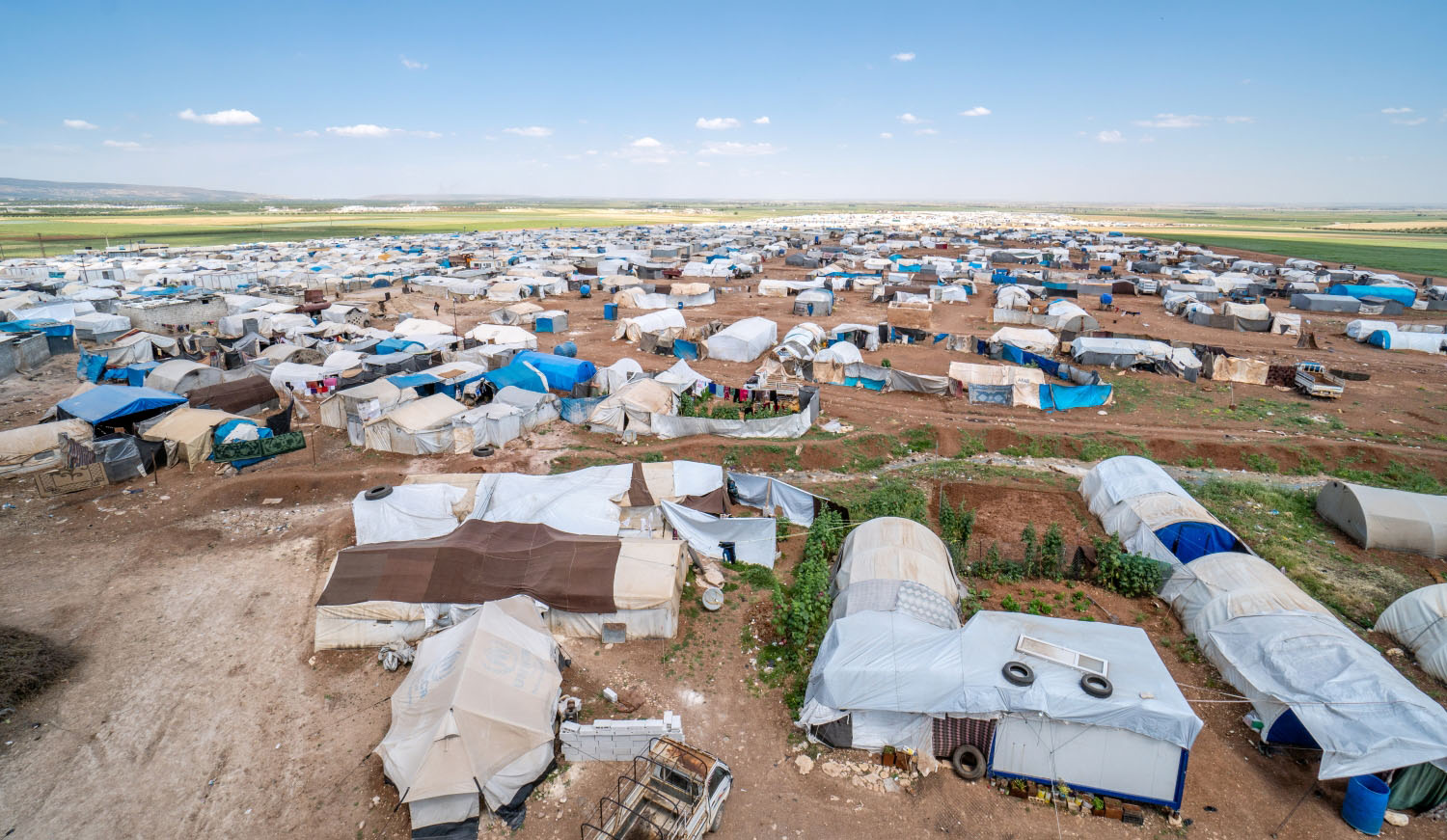The international community is meeting in Brussels this week for the third conference on supporting the future of Syria and the region. While the conference partly focuses on achieving a sustainable political resolution to the Syrian crisis, it also supports the primary host countries of Syrian refugees in the region: Jordan, Turkey, and Lebanon.
The 2016 Jordan Compact was game-changing to how host countries and the international community respond to protracted refugee situations. Jordan has effectively become the model for refugee compacts, providing important lessons learned on which to build subsequent iterations in other protracted displacement contexts. The Compact crowded in concessional financing and beyond-aid incentives, like trade concessions that relaxed rules of origin (ROO) to export to Europe, to support inclusive growth for Jordanians and Syrian refugees alike. These incentives came in tandem with important policy advancements by the government of Jordan, especially around access to livelihoods and self-reliance opportunities for refugees. Critically, the set of policy changes is also designed to benefit Jordanian host communities. For example, reforms included those that improve access to and the ability to register businesses among Jordanians, and improve the business environment and thus facilitate better wages and working conditions for all.
The Jordan Compact came together in large part thanks to significant political will amid the 2015-16 refugee crises in Europe. As the Syrian crisis grinds on without a political resolution, refugees remain displaced, and likely will continue this way for the foreseeable future. The reality of displacement today is protracted—once displaced for five years, a person spends an average of more than 20 years displaced from home. The Syrian refugee situation, already in its ninth year, is unlikely to be different, and planning for medium- and long-term response is pragmatic and necessary for national development. While there have been significant bumps in implementation, Jordan has seized the opportunities for growth enabled by the Jordan Compact and international political will. The question now is how to sustain this growth and engagement sustainably beyond large-scale, annual pledging conferences.
The recent launch of the London Initiative in February is evidence that Jordan and its partners are making progress on answering this question. The London initiative sets out a strategic agenda and establishes partnerships aimed at solidifying a “renewed focus on growth and economic transformation.” This can be viewed as natural evolution and outgrowth of a focus on refugees and the global public good Jordan is providing as a host country. As the London Initiative communique recognizes, Jordan is a key pillar of regional stability. The London Initiative builds on the approach and collaboration created through the Jordan Compact, expanding it to generate international support for inclusive growth in Jordan that enables it to meet its commitments as a host country and geostrategic partner.
The agreements and commitments made at the London Initiative, including $1.8 billion in pledges to support the Jordan growth plans and a UK commitment of $250 million to underwrite a World Bank loan, are highly complementary to the work of the Jordan Compact. The Compact itself is far from perfect. The next phase of implementation presents an opportunity to synch Compact objectives and outputs with and support the vision of the London Initiative—with the goal of achieving and accelerating the results of both.
Jordan has made important progress on the Compact
The Jordan Compact was one of the first significant efforts to extend labor market access to refugees as part of a new response to protracted displacement focused on inclusive growth for refugees and hosts. A number of substantial and effective course corrections have been made over the last three years, and Jordan should continue to identify challenges and adjust policies and practices to alleviate them.
The initial rollout focused too much on simply increasing the number of work permits granted to Syrian refugees and failed to prioritize policies and programs that fit the local context and met the needs of refugee and host populations. Incremental adjustments made since then include expanding the sub-sectors Syrian refugees are permitted to work in and establishing a committee to consider opening other sectors to Syrians; making work permits in some sectors seasonal and/or not tied to one employer; implementing the home-based business registration policy in 2017 and then extending it to cover Syrian refugees in host communities; and other tweaks. These policy changes have been complemented by efforts around better educational access for refugee children and some access to financial services.
The special economic zone (SEZ) elements of the Jordan Compact, especially the relaxed ROO available to companies in SEZs hiring 15 percent of Syrian refugees in their workforce, was potentially transformative in theory but was ill-suited to the realities on the ground. While the 15 percent requirement is an improvement from previous higher thresholds, SEZs remain far from where most Syrian refugees are located and offer working conditions and wages that are often unsatisfactory. More recently, the European Union (EU) and Jordan agreed to extend the ROO access to qualifying companies outside of SEZs, once Jordan has granted 60,000 active work permits to Syrian refugees. This can significantly reconfigure what the ROO and preferential export market access can deliver to Jordan’s growth, allowing companies more conducive to Syrian refugee employment access to European markets. The extension benefits more Jordanian businesses outside of the SEZs by granting export access to the EU. It also incentivizes Syrian refugee employment and opens new job opportunities for Syrians (and Jordanians) in places closer to where they live and in working environments better match their preferences.
But adjustments still need to be made
Important and significant progress has been made, largely spurred by Jordan and facilitated in partnership with donors. Jordan and its partners should continue prioritizing adjustments to the Compact—reassessing policy and implementation efforts and course-correcting where measures are not yet on track to achieve impact. Implementing monitoring efforts, including some of those agreed to at the Brussels II conference in 2018 and as part of the London Initiative, can help further the important progress made by Jordan toward greater self-reliance and inclusive growth for refugees and hosts.
-
Streamline and simplify access to registering home-based businesses. For Syrian refugees, and sometimes Jordanian business owners, costs to registering a home-based business remain prohibitive, financially and otherwise. Registration costs of around 300 JD (often higher than average monthly income), which can be raised further by the high cost of transportation to the various authorities where businesses need to register. Implementing partners on the ground highlight that the requirement of landlord approval for registering a home-based business can be prohibitive. The Jordanian landlord may be unwilling to agree to the registration, whether out of preference or because the building itself is not up to code and does not want to draw the attention of authorities.
-
Clarify the legal and bureaucratic regulations around entrepreneurship. For policy changes around Syrian refugees’ access to labor markets generally, the bureaucratic processes are also overly cumbersome, and/or inconsistently enforced. In the case of Syrian-Jordanian joint ventures (for businesses based outside of the home, where Syrians require a Jordanian business partner), the ambiguous legal regulations and requirements, mixed with lack of refugee access to financial services, can lead to unequal protection for the Jordanian and Syrian business owners. This can compromise the position of the Syrian co-owner and further entrenching risks to human security for refugees. The implementation of home-based business registration is still ramping up, but some of the same arduous bureaucratic requirements are in effect, such as registration approvals from different government and/or municipal departments.
-
Open more sectors to refugees. Currently, there are quotas for hiring that adversely impact when and how much employers can hire non-Jordanians, and in what roles (e.g., few management roles). The sectors in which Syrian refugees can participate in the formal labor market are restricted. Work permits are largely concentrated in construction, agriculture, and manufacturing. Home-based businesses are limited to just three sectors: food processing, handicraft, and tailoring. Removing these restrictions and allowing refugees to access more sectors of the Jordanian economy and types of positions can ensure refugees are working with their maximum added-value—providing skills or capacities that complement those of host populations.
-
Policies should be implemented consistently at national and municipal levels. The policies around Syrian refugee labor market access are set at the national level. However, uptake and enforcement appears inconsistent, and can differ across municipalities at local government levels. Ensuring greater coordination and universal adherence can ensure policies are implemented fairly.
-
Adjust funding requirements to refugee and host populations. There is currently a requirement of 70 percent of funding support, primarily from implementers (INGOs, NGOs, and donors), for home-based or small businesses to go to Jordanians and 30 percent to Syrian refugees. While supporting the host community is critical to inclusive growth, sustainability, and stability, arbitrary funding requirements can stifle opportunities rather than spur them. While 70 percent is commendable, some implementing partners indicate that Jordanians often do not require nor desire the same type or level of support Syrian refugees do when starting a home-based business. This is in part because the Jordanian economy is largely informal, so the pressure for hosts to have formal businesses may be lower. Many host populations may already have established businesses. Jordanians who may choose not to formalize their business do not have the same risks (e.g., deportation) as refugees if caught working informally. The high funding threshold implementers need to meet with host communities to then provide for refugees can stall progress. Bringing Syrian businesses into the formal economy can benefit the local economy because of increased spending and taxes by refugees. Syrian-owned home-based businesses can also be a boon to the economy if they are supplying raw materials from Jordanian businesses. Accelerating Syrian home-based business registration can in fact have strong economic and other benefits for Jordanians, arguably making the division in spending allocations between Syrians and Jordanians less compelling.
Overall, where does Jordan go from here?
The incremental and effective improvement Jordan has made to the Compact has made important contributions to improved livelihoods. The next phase of the Compact should coordinate with and support the London Initiative.
Our recommendations include:
-
Build a better business environment. While extension of ROO outside of the previously designated SEZs is a significant opportunity, the benefits can only be maximized with complementary improvements to the business environment and technical support to Jordanian businesses. Currently, Jordan’s competitiveness and capacity of companies to meet export requirements to utilize the ROO are limited. The private sector and donors can help make strides in this respect with technical assistance to improve capacity and capability of Jordanian companies to export at the scale and quality required. In-country initiatives already underway, like the International Rescue Committee job centers, could be integrated into the Five-Year Growth Matrix. Improving the business environment is relevant not only to the Jordan Compact, but it is a pillar of the London Initiative around Jordan’s economic development overall. Creating more favorable business conditions can unlock greater private sector investment and open policy space for more Jordanian small and medium enterprises (SMEs) to grow, formalize, or start up.
-
Expand labor market participation. Facilitating refugee labor market participation is a central pillar of the Jordan Compact, and this should be done alongside broader participation efforts. The London Initiative and communique focused significantly on better enabling women’s workforce participation, with the aim to increase it by 5 percent by 2025. Toward this, improvements to implementing the Decent Work agenda can improve overall labor conditions in Jordan, benefiting Jordanians, refugees, and the tens of thousands of migrant workers also in Jordan. Addressing skills mismatches and shortages can also better enable the business environment. Directly engaging with the private sector can improve the shaping of technical and vocational educational training (TVET) programs in Jordan. Overall, refugees should be mainstreamed into these efforts and more funding invested in workforce participation programs to improve for inclusive results. For example, only four percent of issued work permits have gone to Syrian refugee women. And, as the conversation around a “one refugee” approach gains momentum, workforce access should be extended to the more than 80,000 non-Syrian refugees.
-
Institute robust evaluation and monitoring. The commitments made during the London Initiative in February can provide useful basis for going into discussions with Jordan during the Brussels III conference. Coordinating with the London Initiative can help ensure the Jordan Compact targets and goals are streamlined and integrated into the broader framework. The Five-Year Growth and Reform Matrix, which lays out Jordan’s plans for economic development toward growth and inclusiveness, is an opportunity to measure against specific goals and outcomes, and identify areas of necessary adjustment to keep that growth on track. A Jordan Task Force has recently been created to follow-up on London Initiative partners. It will reportedly be jointly chaired by Jordan and the United Kingdom, and members include other donors, private sector stakeholders, civil society, and international financial institutions (IFIs) convening every six months. Especially as Jordan faces national challenges around International Monetary Fund austerity programs, tracking and monitoring of efforts toward greater macroeconomic and fiscal stability can drive the important development trajectory for Jordan as a whole, with demonstrable benefits to refugee populations.
It will be a huge success if supporting refugees is considered part of regular national planning and economic development strategies. While ensuring the specific needs and dynamics unique to refugees are taken into account, approaching Jordan’s development holistically can unlock additional growth opportunities and international investment.
Thanks to Mathilde Vu and Lauren Post for their thoughtful comments and feedback. All errors are our own.
Disclaimer
CGD blog posts reflect the views of the authors, drawing on prior research and experience in their areas of expertise. CGD is a nonpartisan, independent organization and does not take institutional positions.






